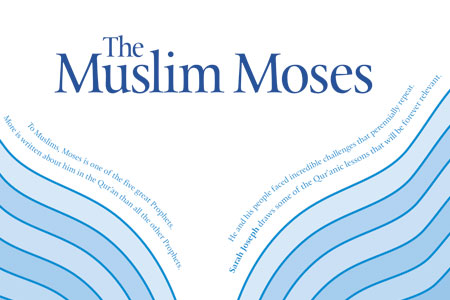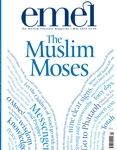
The Muslim Moses
Issue 92 May 2012
To Muslims, Moses is one of the five great Prophets. More is written about him in the Qur’an than all the other Prophets. He and his people faced incredible challenges that perennially repeat. Sarah Joseph draws some of the Qur’anic lessons that will be forever relevant.
“AND CALL to mind, through this Divine writ, Moses. Behold, he was a chosen one, and was an apostle, a prophet. And We called upon him from the right-hand slope of Mount Sinai and drew him near in mystic communion and, out of Our grace, We granted unto him his brother Aaron, to be a prophet.”
Qur’an. 19:51-53
Typically associated with Judaism and the first five books of the Bible, Moses is mentioned an astonishing 136 times in the Qur’an, making him the most oft-mentioned person in God’s final Revelation. It is vital, therefore, to understand what Moses means for Muslims, and what is to be learned from the life of this man whom God chose to honour.
The lessons from Moses start with the faithfulness of his mother. When Pharaoh persecuted the Israelites by “slaughtering their sons and letting their women live,” God revealed to the mother of Moses, “Place him into a box and place it upon the sea. The sea will wash it up on the shore, where an enemy of Mine and his will pick it up.” (20:38-39)
Such a command could not have been very reassuring at the time—when you fear death for your child, the obvious solution is not to place him in a coffin-like box, lower him into rough waters, only for him to be discovered by his enemy. But that is God’s way, and Moses’ mother displayed exceptional faith and trust in God. She totally surrendered to Him, for she believed His promise that mother and son would be re-united.
Moses, a baby in danger of Pharaoh’s cull, was delivered by the river straight to Pharaoh. God chose to place this vulnerable baby at the heart of the tyrant’s dominion. Why? Perhaps such close proximity to power would grant Moses a certain familiarity with Pharaoh. From a distance, oppressors can appear invincible; the oppressed are conditioned to the extent they become helpless. Yet growing up close to Pharaoh made Moses impervious to his terror; the day-to-day immediacy allowed Pharaoh to be seen as the human he was, rather than the god he claimed to be.
Time passed. Moses grew up. Then one day there was a fight between an Egyptian and a Hebrew, who called out to Moses and he intervened. In the scuffle, Moses accidently killed the Egyptian. Aghast at what he had done, he appeals to God, “My Lord! Verily, I have wronged myself, so forgive me,” and God reminds him that, “He is the Oft-Forgiving, the Most Merciful.” (28:15-16) This incident from his life shows that even someone who was to be a prophet of God can make mistakes, but with God’s Mercy there is always a way back to Him. As Prophet Muhammad said, “The one who repents from sin is like the one who never sinned.” (Ibn Majah)
Bookmark this |
|
Add to DIGG |
|
Add to del.icio.us |
|
Stumble this |
|
Share on Facebook |
|
Share this |
|
Send to a Friend |
|
Link to this |
|
Printer Friendly |
|
Print in plain text |
|


Comments
0 Comments